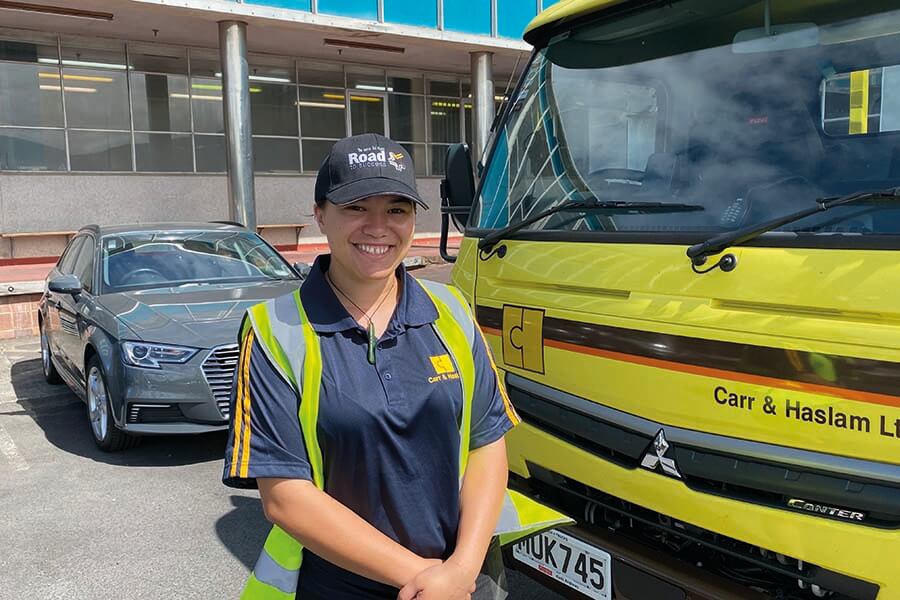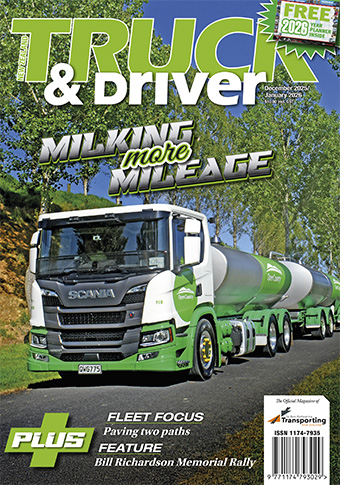Ia Ara Aotearoa Transporting New Zealand News


Road to success supporting new entrants to the industry
New Zealand’s shortage of truck drivers has led to the development of the Road Transport Forum’s Te ara ki tua Road to success traineeship, aimed at assisting road transport operators to recruit new trainees and overcome the industry’s considerable workforce problems.
The RTF administers Road to success and is working with the Ministry of Social Development (MSD) on placing registered job seekers and those affected by COVID-19 with road transport operators. This is not the only source of trainees however, and any suitable person can sign up for Road to success once matched with a willing employer. The traineeship lasts a year.
“A huge amount of work has gone into working with both the industry and Government to develop the programme and we believe that over the next five to 10 years it can, if the industry continues to support it, play a major role in helping operators take on new staff,” says RTF chief executive Nick Leggett.
...New Zealand’s shortage of truck drivers has led to the development of the Road Transport Forum’s Te ara ki tua Road to success traineeship, aimed at assisting road transport operators to recruit new trainees and overcome the industry’s considerable workforce problems.
The RTF administers Road to success and is working with the Ministry of Social Development (MSD) on placing registered job seekers and those affected by COVID-19 with road transport operators. This is not the only source of trainees however, and any suitable person can sign up for Road to success once matched with a willing employer. The traineeship lasts a year.
“A huge amount of work has gone into working with both the industry and Government to develop the programme and we believe that over the next five to 10 years it can, if the industry continues to support it, play a major role in helping operators take on new staff,” says RTF chief executive Nick Leggett.
If a trainee is sourced through MSD there will be no administration fee cost to a business employing that trainee. Furthermore, MSD may be able to subsidise approximately one-sixth of a trainee’s wages, as well as providing some financial assistance for the trainee’s work readiness.
A survey of more than 600 operators undertaken by the RTF in early 2020 found that a large number of trucks were parked up because of the lack of drivers.
The Road to success training, which is a mixture of practical and theoretical components, is designed to lead directly to qualifications relevant to the industry. These are in the form of micro-credential qualifications completed online. It also allows recruits to undertake large chunks of training while going about their normal day-to-day jobs.
While a lot of operators already undertake some inhouse or external training, it is largely based on progressing drivers through the various driver licence levels. What Road to success seeks to do is make the industry more appealing to young people starting out on a career, or those looking to try something new, by offering formal qualifications while they work and earn money.
“The reality for a lot of young people is that they simply do not have the luxury to gain qualifications before they enter the workforce, so it is imperative that as an industry, road transport offers them the chance to both earn a decent wage and work towards qualifications at the same time,” says Leggett.
Betty Heremaia Sola is the first trainee from the Kiwi Can Do course, and the first MSD job seeker placement in the traineeship. She started with Carr & Haslam in Mt Wellington in February, and the team there is already impressed with her attitude and approach to the business of car transportation.
Betty is 21 and lives in Auckland. She heard about Road to success when project co-ordinator Fiona McDonagh attended a careers open day through MSD’s Kiwi Can Do programme. She drives a Class 2 truck with the company’s driver trainer and has begun her online training.
“There are regular check-ins – both in person and via phone and emails,” says Betty. “They have reminded me many times that they are always there if needed. If I have any concerns about my place of work or am struggling with the micro-credentials, then at any time I can contact them. I appreciate the support they offer; it is very motivational for me.”
Following her experience, Betty urges others to follow her path: “There are so many opportunities in life and if you have the chance to jump at them, then I say jump. I have noticed that truck driving is a very male-dominated industry but if I – a 21-year-old woman who is currently training to become a truck driver – can do it, then so can all the other young individuals wanting to.
“Don’t let age, gender and experience intimidate you – we all start somewhere. We don’t get to the top without beginning at the bottom, and that is a lesson within itself. Through courage and confidence, we can all make it.”
Connor Mose from Whangarei learned about the programme through the company he works for, Mainstream Freight.
“I grew up around trucks from as soon as I could walk, and I have always wanted to be a trucker. I already had a full Class 1 licence and now hold a Class 2. My friends and family are really supportive of this programme – they help me and encourage me to do my best so I can be fast-tracked to my Class 5.”
Connor has been working for Mainstream’s Whangarei depot since July 2020. He undertakes a variety of tasks, from office work to driving and loading.
“I am doing lots of buddy driving with an experienced driver who works for us. I have enjoyed all aspects of the programme as it has been very interesting and I have learnt a few new things.”
Connor says the training is very useful and he can’t wait to put his learning to use when he is driving: “I would love to own my own trucking business. I wouldn’t mind getting into tipper trucks and heavy machinery operating. I would suggest that people who want to start this course come into the course with their eyes and ears wide open – willing to learn and use everything they learn in their everyday lives.
“I have really enjoyed this programme and can’t wait to complete it. It has been an awesome opportunity and I’d like to thank everyone who has supported and helped me.”
Mainstream Freight operations manager Michael Lovell can’t speak highly enough of Connor: “I know his attitude and what his work ethic is like. And I just know I have got a little superstar on my hands.”
Lovell says that Connor already knew a lot of the material in the traineeship micro-credentials and for what he didn’t know, he used his instincts: “He’ll take information on like a sponge and then apply it the next time he goes out. He is willing to learn; he’s willing to take that step further.”
There are, Lovell adds, good reasons why it takes a long time to get the licences needed to be a professional driver: “I personally believe that a truck is a weapon – even a car is a weapon in an uninitiated driver’s hands. And unfortunately, 18-year-olds prove themselves to be idiots behind the wheel.
“Not all of them – it’s just some of them. You do get those sensible people out there and I think we live in a world that punishes the sensible people for what the stupid people do.
“A programme like this, where you are willing to fast-track the licence process for somebody who wants it badly and is sensible about it, is a good thing,” he adds. “Because otherwise he would have breezed off and done something else – he’d get bored very quickly. He’d look at six or seven years of his life and end up doing something else.”
RTF now has two staff members, Fiona McDonagh and Caleb Rapson Nuñez del Prado, dedicated to Road to success and operators and potential trainees can find out more about getting involved in the traineeship at www.roadtosuccess.nz



 + EQUIPMENT GUIDE - FREE
+ EQUIPMENT GUIDE - FREE
